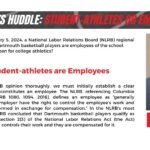By: Associate Tonika Brown
“The key is not the will to win, it is the will to prepare to win.” – Bobby Knight
Virtual forms of communication, including e-mail, have become essential to business practices. The question remains whether virtual correspondence holds the same value as written agreements.
Imagine you and a group of 17 friends decide to sell your assets to the highest bidder. The group decides to include a clause that allows free negotiations with bidders until a decision is made. What if these negotiations take place via e-mail? Can those e-mails serve as a contract between the parties? Or, is the e-mail string simply negotiations and did not bind the parties to a transaction?
In Texas, we know “a deal is a deal and the courts protect the rights of parties to enter into agreements. Indeed, Texas courts will honor an oral contract, sealed by a handshake, even a $10.53 billion handshake”. See Texaco, Inc. v. Pennzoil, Co., 729 S.W.2d 768, 795 (Tex. App.—Houston [1st Dist.] 1987, writ ref’d n.r.e.). “The common law has long recognized that a parties’ agreement can be expressed in multiple writings exchanged between the parties.” See, e.g., Fort Worth Indep. Sch. Dist. v. City of Fort Worth, 22 S.W.3d 831, 840 (Tex. 2000)
The Texas Supreme Court recently advised, in Chalker Energy Partners III, LLC v. Le Norman Operating LLC, No. 18-0352, 2020 WL 976930, at *1 (Tex. Feb. 28, 2020), e-mails are such writings under specific circumstances.
In the above case, the Sellers agreed to sell their assets for tens of millions of dollars. To facilitate the negotiations, the Sellers and one of the bidders, Le Norman Operating LLC (LNO), entered into a confidentiality agreement containing a “No Obligation” clause. This permitted the parties to negotiate without fear of being bound to a sale “unless and until a definitive agreement was executed and delivered”.
The Sellers and LNO exchanged several emails regarding the purchase of the assets, but the Sellers decided to sell the assets to another company. LNO brought a breach of contract action alleging that the Sellers breached an alleged contract entered into through the email exchange.
The trial court granted summary judgment for the Sellers and concluded that there was no meeting of the minds. The court of appeals reversed, holding that whether LNO and the Sellers intended to be bound by the terms set forth in the exchanged emails were fact issues precluding summary judgment. The Supreme Court reversed, holding that the emails did not constitute a definitive agreement.
The Texas Supreme Court decided that the e-mail exchange did not create a contract because parties did not intend to be bound to any agreement, as indicated by the “No Obligation” clause. The Court determined as a matter of law, the parties did not execute and deliver a definitive agreement. Accordingly, the Court held:
1. A definitive agreement is a condition precedent to contract formation; and
2. E-mails were not a definitive agreement and thus did not satisfy condition precedent; and
3. E-mails did not result in a waiver of sellers’ right to a definitive agreement.
Therefore, an e-mail exchange alone is not enough to determine there was a meeting of the minds. Accordingly, the Texas Supreme Court confirmed precedent “a party seeking to recover under a contract bears the burden of proving that all conditions precedents have been satisfied.” Associated Indem. Corp. v. CAT Contracting, Inc., 964 S.W.2d 276, 283 (Tex. 1998).
How can you protect your negotiations?
- Include a clause in your confidentiality agreement in writing, prior to initiating negotiation discussions, that you are not indicating a definitive agreement at any stage of negotiations.
- Include a disclaimer stating the same following your signature block in all emails.
With the changing times and the legal world trying to catch up, this is a great start to protect yourself. Technology is advancing and communication is becoming more informal each day. It is important to be mindful of how you communicate, even if it is “just” an email.
Need more ways to protect your email communication? Huddle with Stewart Law Group to discuss at [email protected].







